The Unbearable Lightness of Being (1987): when literature is bigger than the screen | cuando la literatura es más grande que la pantalla
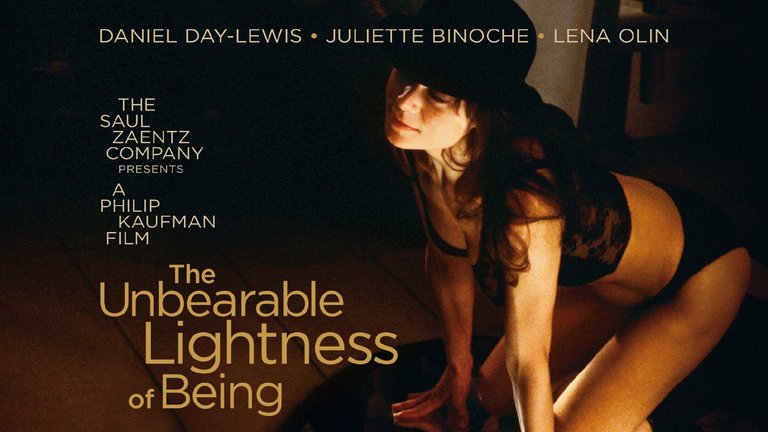
I wanted to see this movie as much as I wanted not to see it. On the one hand, it is the film version of the most celebrated novel by one of my favorite authors, but on the other hand, we know that any story (with very rare exceptions) is always better in its original version on paper than on the screen, especially when there are things non-transferable from one medium to another, as in the case of the next Netflix series about One Hundred Years of Solitude by Gabriel García Márquez that I do not intend to see for anything the world.
Tenía tantas ganas de ver esta película como de no verla. Por un lado, se trata de la versión cinematográfica de la novela más celebrada de uno de mis autores favoritos, pero por otro lado, sabemos que cualquier historia (con muy raras excepciones) siempre es mejor en su versión original en el papel que en la pantalla, sobre todo cuando existen cosas intransferibles de un medio a otro, como en el caso de la próxima serie de Netflix sobre Cien años de soledad de Gabriel García Márquez que no pienso ver por nada del mundo.
But in the case of The Unbearable Lightness of Being I let myself be convinced because I just read the novel for the third (or fourth?) time and because it stars Daniel Day-Lewis and Juliette Binoche, whom I greatly admire and I've seen them in very good roles and in very good stories. The film is directed by Philip Kaufman, who wrote the script with Jean-Claude Carrière, based on the novel of the same name by the writer of Czech origin, Milan Kundera. It could be said that the center of the plot revolves around three characters: Tomas (Daniel Day-Lewis), Teresa (Juliette Binoche) and Sabina (Lena Olin). Tomas is a young doctor with a promising career, a great present and an obsession with women, who seem to fall for his charms in almost any situation. For this reason, Tomas has occasional lovers and other recurring ones, but the most important is Sabina, with whom he maintains a relationship that we could call an erotic friendship, because although they see each other to have sex, they know each other very well and trust each other with their personal things. That seems to be all in Tomas' life until Teresa appears, a waitress he met at a health resort and who comes to Prague to live with him. However, Teresa's presence in his bed, in his house and in his life does not make Tomas abandon his game with the other women. He loves her in a way he loves no one else, but he can't give up his previous lifestyle.
Pero en el caso de La insoportable levedad del ser me dejé convencer porque acabo de leer la novela por tercera vez (¿o cuarta?) y porque la protagonizan Daniel Day-Lewis y Juliette Binoche, a quienes admiro mucho y los he visto en muy buenos papeles y en muy buenas historias. La película está dirigida por Philip Kaufman, quien escribió el guión junto a Jean-Claude Carrière, basándose en la novela homónima del escritor de origen checo, Milan Kundera. Pudiera decirse que el centro de la trama gira en torno a tres personajes: Tomas (Daniel Day-Lewis), Teresa (Juliette Binoche) y Sabina (Lena Olin). Tomas es un joven médico con una carrera prometedora, un gran presente y una obsesión por las mujeres, quienes parecen caer rendidas ante sus encantos casi en cualquier situación. Por eso, Tomas tiene amantes de ocasión y otras recurrentes, pero la más importante es Sabina, con quien mantiene una relación que podríamos llamar una amistad erótica, pues aunque se ven para tener relaciones, se conocen muy bien y se confían sus cosas personales. Eso parece ser todo en la vida de Tomas hasta que aparece Teresa, una camarera que conoció en un balneario y quien se viene a Praga a vivir con él. Sin embargo, la presencia de Teresa en su cama, en su casa y en su vida, no hacen que Tomas abandone su juego con las demás mujeres. La ama de una forma que no ama a nadie más, pero no puede renunciar a su estilo de vida anterior.
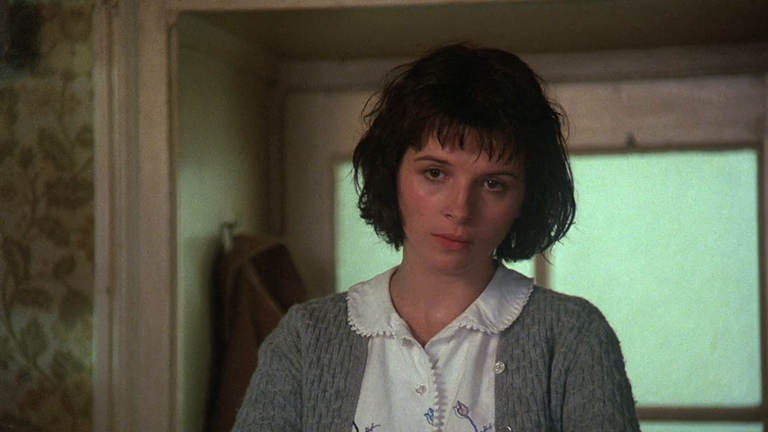
Of course that brings a series of arguments, insecurities and nightmares for Teresa and bad times for Tomas who doesn't know how, or rather doesn't want to, either leave Teresa or live without the others. As cruel or strange as it may seem, even Sabina becomes friends with Teresa and helps her settle down and feel better. She sleeps with her husband, yes, but - for them - that doesn't mean that they cannot be friends or that Sabina cannot also become fond of Teresa and vice versa.
Por supuesto eso trae una serie de discusiones, inseguridades y pesadillas para Teresa y malos ratos para Tomas que no sabe cómo, o más bien no quiere, ni dejar a Teresa ni vivir sin las demás. Por cruel o extraño que parezca, incluso Sabina llega a hacerse amiga de Teresa y a ayudarla a establecerse y a sentirse mejor. Se acuesta con su esposo, sí, pero - para ellas - eso no significa que no puedan ser amigas o que Sabina no pueda tomarle cariño también a Teresa y viceversa.
But in addition to them there are other secondary characters (one of them is played by a young Stellan Skarsgård) and in addition to the love, jealousy and sex that this love triangle implies, the film also has high political content because Teresa and Tomas meet each other few years before the Prague Spring and the Russian invasion of Czechoslovakia (occurred in 68) and the persecution that followed by the Soviets of Czech intellectuals, politicians, leaders, etc. For different reasons, both Teresa and Tomas find themselves involved in compromising situations and decide to emigrate to Switzerland. Prague is no longer their home, it's now a territory occupied by the Russians and they hope to rebuild a new life in Geneva. In order not to tell you the whole story, I will just say that Sabina has also emigrated to Switzerland and there she meets Franz and that we see some other characters appear who also deal with exile, with how quickly the world has forgotten about Prague, with the contradiction between wanting compatriots to fight there at home but saying so from abroad and many other things similar to what most immigrants may have gone through. The scenes that have to do with the protests and all that political context are very well put together (there are some sequences filmed in black and white) and they reflect with great fidelity - from what I have been able to find out - the way in which those events were experienced in the streets of Prague. In fact, I'd say it's the best part of the movie.
Pero además de ellos hay otros personajes secundarios (uno de ellos es interpretado por un joven Stellan Skarsgård) y además del amor, los celos y el sexo que implica ese triángulo amoroso, la película también tiene alto contenido político porque Teresa y Tomas se conocen pocos años antes de la Primavera de Praga y la invasión rusa a Checoslovaquia (ocurrida en el año 68) y la persecución que siguió a eso por parte de los soviéticos hacia los intelectuales checos, políticos, dirigentes, etc. Por distintas razones, tanto Teresa como Tomas se ven envueltos en situaciones comprometedoras y deciden emigrar a Suiza. Praga ha dejado de ser su hogar, ahora es un territorio ocupado por los rusos y esperan rehacer una nueva vida en Ginebra. Para no contarles toda la historia, sólo dire que Sabina también ha emigrado a Suiza y allí conoce a Franz y que vemos aparecer algunos otros personajes que también lidian con el exilio, con lo rápido que el mundo se ha olvidado de Praga, con la contradicción entre querer que los compatriotas luchen allá en casa pero decirlo desde el extranjero y muchas otras similares a las que pueden haber pasado la mayoría de los inmigrantes. Las escenas que tienen que ver con las protestas y todo ese contexto político están muy bien armadas (hay unas secuencias filmadas en blanco y negro) y reflejan con gran fidelidad - por lo que he podido averiguar - la forma en que se vivieron esos eventos en las calles de Praga. De hecho, diría que es la mejor parte de la película.
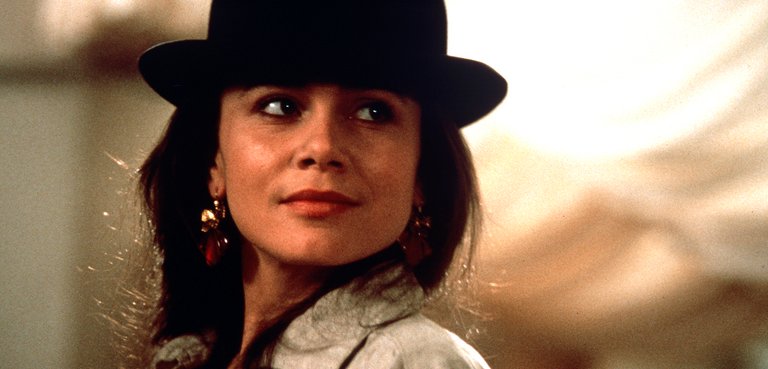
Because with the rest of the film I do have some observations. First, I understand that the novel tells the story of Czech characters, but if it's done in English, why do they make them speak with that accent that feels so fake? If you wanted to be faithful to the original spirit, then make it in Czech, but if you decided to make it in English, then don't make all the authors speak like Russian imitations. Maybe it's something superficial, but I didn't like it, although the casting did seem appropriate to me and just like in the novel, in the film is also Sabina the character who steals the show.
Porque con el resto de la cinta sí tengo algunas observaciones. Primero, entiendo que la novela cuenta la historia de personajes checos, pero si está hecha en inglés, ¿por qué los hacen hablar con ese acento que se siente tan fingido? Si querían ser fieles al espíritu original, entonces háganla en checo, pero si decidieron hacerla en inglés, entonces no hagan hablar a todos los autores como imitaciones rusas. Quizá es algo superficial, pero no me gustó, aunque el casting sí me pareció apropiado y al igual que en la novela, en la película también es Sabina el personaje que se roba el show.
But the most important problem and the greatest challenge of having decided to adapt this novel is the fact that The unbearable lightness of being is a deeply psychological and philosophical novel in which much of its content is reflections, analyzes and questions that the author/narrator asks. When adapting the book, Kaufman managed to sneak in some of these ideas as lines of dialogue, but in many cases those words don't look good in the mouths of the characters who utter them because it makes them seem more conscious, thoughtful, and profound than they are in the book or in the rest of the movie. In the book we observe them and think some things that they don't know about themselves, but here they are the ones who say them. In addition to that, while you can't convey the entirety of a book to the screen, I feel that in some parts I was only able to understand or size the scenes because I have read the book several times, but many of those connections are not clear for a viewer who is unaware of the novel, which plays against the story. Now, it must be said, the international impact of the film (which was even nominated for two Oscars and won a Golden Globe) served to disseminate not only the Czech reality at the time but also to further expose Milan Kundera's work, one of the best writers in history for whom there can be no better tribute than forgetting to watch this movie and reading - over and over again - his exquisite work, have any of you read the book? Have you seen the movie? I read you in the comments.
Pero el problema más importante y el mayor desafío de haber decidido adaptar esta novela es el hecho de que La insoportable levedad del ser es una novela profundamente psicológica y filosófica en la que mucho de su contenido son reflexiones, análisis y preguntas que hace el autor/narrador. Al adaptar el libro, Kaufman logró colar algunas de estas ideas como líneas de diálogo, pero en muchos casos esas palabras no quedan bien en boca de los personajes que los enuncian porque los hace parecer más conscientes, reflexivos y profundos de lo que lo son en el libro o en el resto de la película. En el libro los observamos y pensamos algunas cosas que ellos ignoran sobre sí mismos, pero acá son ellos quienes las dicen. Además de eso, si bien no se puede transmitir la totalidad de un libro a la pantalla, siento que en algunas partes sólo fui capaz de entender o de dimensionar las escenas porque he leído el libro varias veces, pero muchas de esas conexiones no están al alcance de un espectador que desconzca la novela, lo que juega en contra de la historia. Ahora bien, hay que decirlo, la repercusión internacional de la película (que incluso fue nominada a dos premios Oscar y ganó un Globo de Oro) sirvió para difundir no sólo la realidad checa de la época sino también para exponer aún más el trabajo de Milan Kundera, uno de los mejores escritores de la historia para quien no puede existir mejor homenaje que olvidarse de ver esta película y leer - una y otra vez - su exquisita obra, ¿alguno de ustedes ha leído el libro? ¿han visto la película? Los leo en los comentarios.
Reseñado por @cristiancaicedo
Other posts that may interest you | Otros posts que pueden interesarte:
  |
|---|
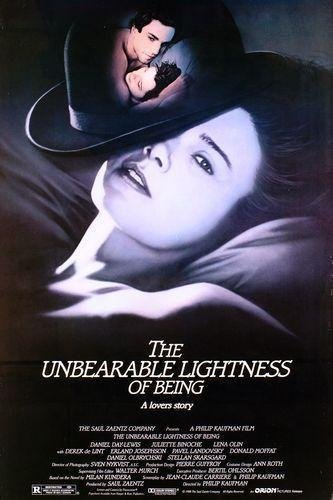

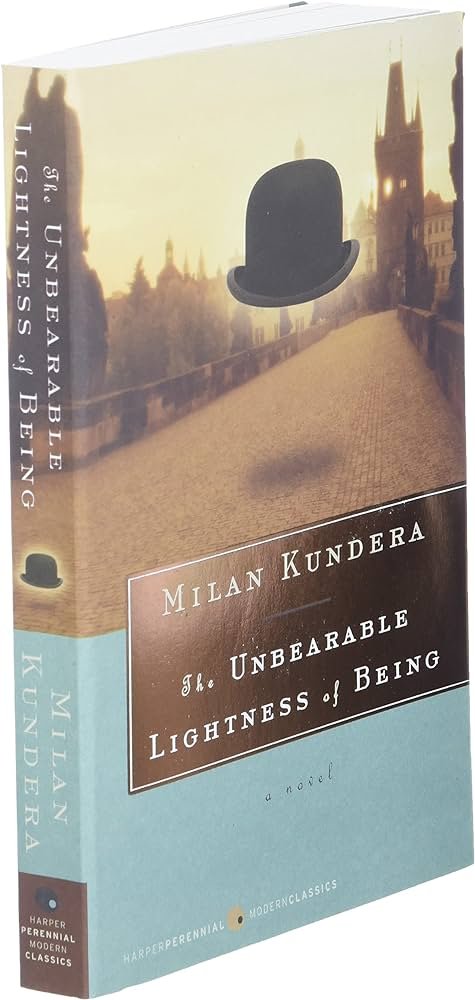
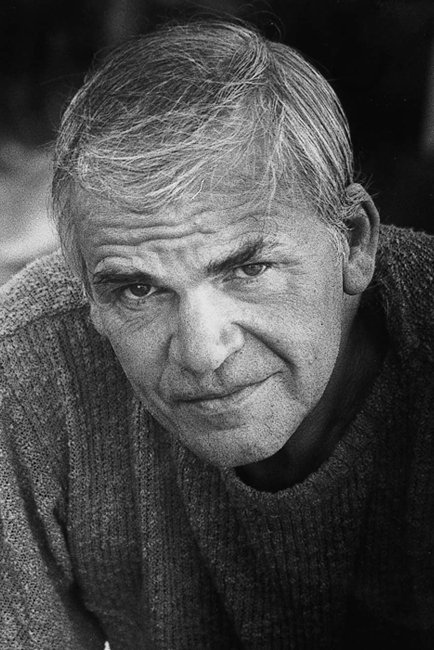
Yeehaw! This here blog post sure does capture the essence of a good ol' tale told under the stars. Keep on embracing them stories, cowboy!
Thank you so much for your support!
Keep on ridin', partner! Your trailblazin' spirit shines bright for all to see. Onward to new horizons!
Interesting review! I too am convinced that bringing something from literature to the screen is always a challenge most of the time it doesn't always end well, especially depending on the complexity of the tapes. This novel looks quite interesting but I'd like to read it first 🤔.
I encourage you to read it, it's an amazing book. Greetings.
Una reseña bastante ponderada de este filme, que si bien tiene logrados aspectos, como la actuación, en otros, como lo adviertes, no alcanza la mejor expresión. Era realmente un reto atreverse a llevar esta novela al cine. Saludos, @cristiancaicedo.
Muchas gracias por el apoyo, una vez más. Saludos.